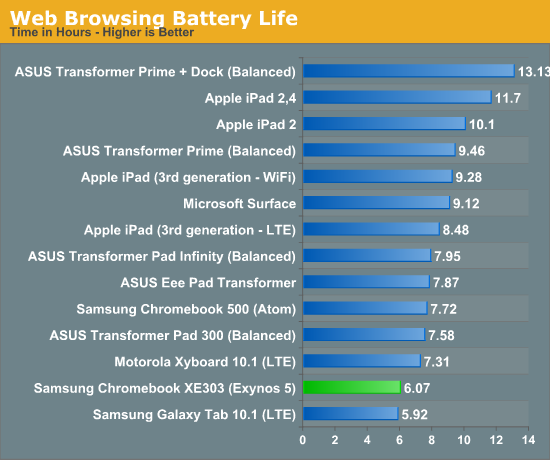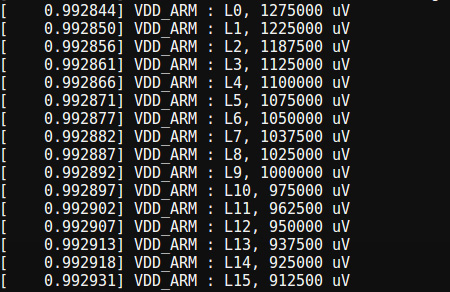Samsung Chromebook (XE303) Review: Testing ARM's Cortex A15
by Anand Lal Shimpi on October 31, 2012 9:00 AM ESTBattery Life & Power Analysis
The final unknown in all of this is power consumption. ARM's Cortex A15 isn't really supposed to be a sipper of power, and when placed in a notebook I don't know that there's a lot we can conclude about how it stacks up to Atom either. Some high level power consumption data would normally help but these two platforms are fairly different:
| Samsung Chromebook Power Consumption Comparison | ||||||
| Display @ 200 nits | Idle | Kraken (Avg) | Kraken (Peak) | |||
| Samsung Chromebook 500 (Atom N570) | 11.53W | 14.4W | 15.2W | |||
| Samsung Chromebook 303 (Exynos 5 Dual) | 6.33W | 10.5W | 11.3W | |||
The new Chromebook consumes considerably less power at idle than its predecessor. The smaller display, simplified motherboard and truly integrated SoC platform are likely all to thank for this. The significant reduction in power also helps explain the big reduction in battery capacity as well.
Under load, the two platforms do see differing levels of additional power consumption. The new Exynos 5 based Chromebook sees a dramatic increase in power consumption under load, hitting 10.5W (a 66% increase over idle) while running Mozilla's Kraken benchmark. The Atom N570 based Chromebook increases power consumption as well, but just not by as significant a degree: ~25%. This actually helps illustrate exactly why Atom wasn't phone worthy in its earlier incarnations. Contrary to popular belief, it wasn't actually peak power consumption that was the problem (a move to 32nm can easily eat into these numbers). The total platform power consumption, particularly at idle, was Atom's real problem in the early days. It also turns out that this is much of what keeps Intel's Core processors from moving into ultra mobile form factors, something that Haswell is supposed to address.
Given that we're dealing with somewhat different panels here, I wanted to see what power consumption looked like if we removed the panels from the equations. I re-ran all of the power data with the display turned off:
| Samsung Chromebook Power Consumption Comparison | ||||||
| Display Off | Idle | Kraken (Avg) | Kraken (Peak) | |||
| Samsung Chromebook 500 (Atom N570) | 8.82W | 11.4W | 12.4W | |||
| Samsung Chromebook 303 (Exynos 5 Dual) | 4.07W | 8.32W | 9.27W | |||
The old Atom based Chromebook uses more than twice the idle power of the new version - it's no wonder Google was able to get away with a battery half the size. Once again however we see a much larger increase in power consumption once the Cortex A15 is under heavy load. Active power consumption more than doubles on the new Chromebook, while we see around a 30% increase on the Atom based system. I do wonder what will have to be done to get the Exynos 5 Dual into a smartphone as an increase of ~4W under load just won't cut it in a phone. The Atom platform shows a 2.6W increase in power under load, which sounds about right for a high clocked 45nm part.

Despite the more power efficient platform, the reduction in battery capacity puts the new Chromebook well below the Atom model in battery life. Our wireless web browsing test put the new Chromebook at just over 6 hours of continuous use on a single charge. For a notebook that's not too bad, but compared to modern tablets it's not good.

The performance gains over Atom (and by extension, the ARM Cortex A9) do give us some indication as to what could be done to get Exynos 5 into a smartphone. By dropping clocks much lower than 1.7GHz Samsung would be able to maintain a performance advantage in a very power constrained device and hopefully keep power in check. The photo above features a list of all of the voltage levels supported by Samsung's Exynos 5 Dual as implemented in the new Chromebook.










149 Comments
View All Comments
superflex - Wednesday, October 31, 2012 - link
Way to use the crappiest pictures of the display you could wrestle up.If the display is on par with other 768 TN panels used in laptops reviewed by AT, why did you use those washed out pictures of the display? I don't see the same lack of photography skills when reviewing other laptops with similar panels.
I guess since Google isn't stroking AT the same way Apple does, a fair review with fair pictures would be pointless.
Hacks!
PsychoPif - Wednesday, October 31, 2012 - link
Why would you base your opinion on a picture when they provide numerics to back up the review?Since I learned about Photoshop, I no longuer believe what I see on a picture anyway.
superflex - Wednesday, October 31, 2012 - link
Ever hear the phrase "A picture says a thousand words"?For the casual viewer, who may not delve into the display numbers, the pictures certainly do tell a story. It just depends on what story AT wants to tell.
superflex - Wednesday, October 31, 2012 - link
Look at the review of the Dell XPS 14Z. According to the numbers in this review, the panel in the Sammy CB is on par, if not better than the one used by Dell. Look at the pictures of the Dell display vs the CB display. Are they on par with one another?You can certainly influence a consumers purchasing decision based on some sub-par photographs.
Well done AT.
PeteH - Wednesday, October 31, 2012 - link
Do you really think the people technologically sophisticated enough to be interested in an AnandTech review are the same people who would base their purchasing decision on one photograph of a display?superflex - Wednesday, October 31, 2012 - link
Do you really think nobody will do a Google search for "Samsung Chromebook Review" and find AT's site on the list?I guess Google is smart enough to know a persons IQ and direct them away from AT and its "sophisticated" readers.
Sheeesh, get over yourself.
PeteH - Wednesday, October 31, 2012 - link
Seriously? Just start reading the review, it is clearly not targeted at consumers. Heck, there's a photo of a circuit board on the first page! There's a tear down of the device (complete with photos) before the display is even discussed! Who is going to read this review other than people who care deeply about the technical aspects of the Chromebook?But I'm starting to think you know that, and the real reason you're upset is because AnandTech pointed out that the Chromebook has a crappy display.
SND_ - Wednesday, October 31, 2012 - link
Most likely the Chromebook doesn't have a very good display AND the picture sucks.I did notice that the display looks very poor in that image. I doubt it's that bad (two feet in front of you). . . typing "Chromebook" into Google will fetch you better pictures of suggesting a display of higher quality.
LogOver - Wednesday, October 31, 2012 - link
I would like to see a comparison with the Celeron-based Chromebookkrumme - Wednesday, October 31, 2012 - link
Celleron is a different price segment.The comparison was perfect and valid imho.